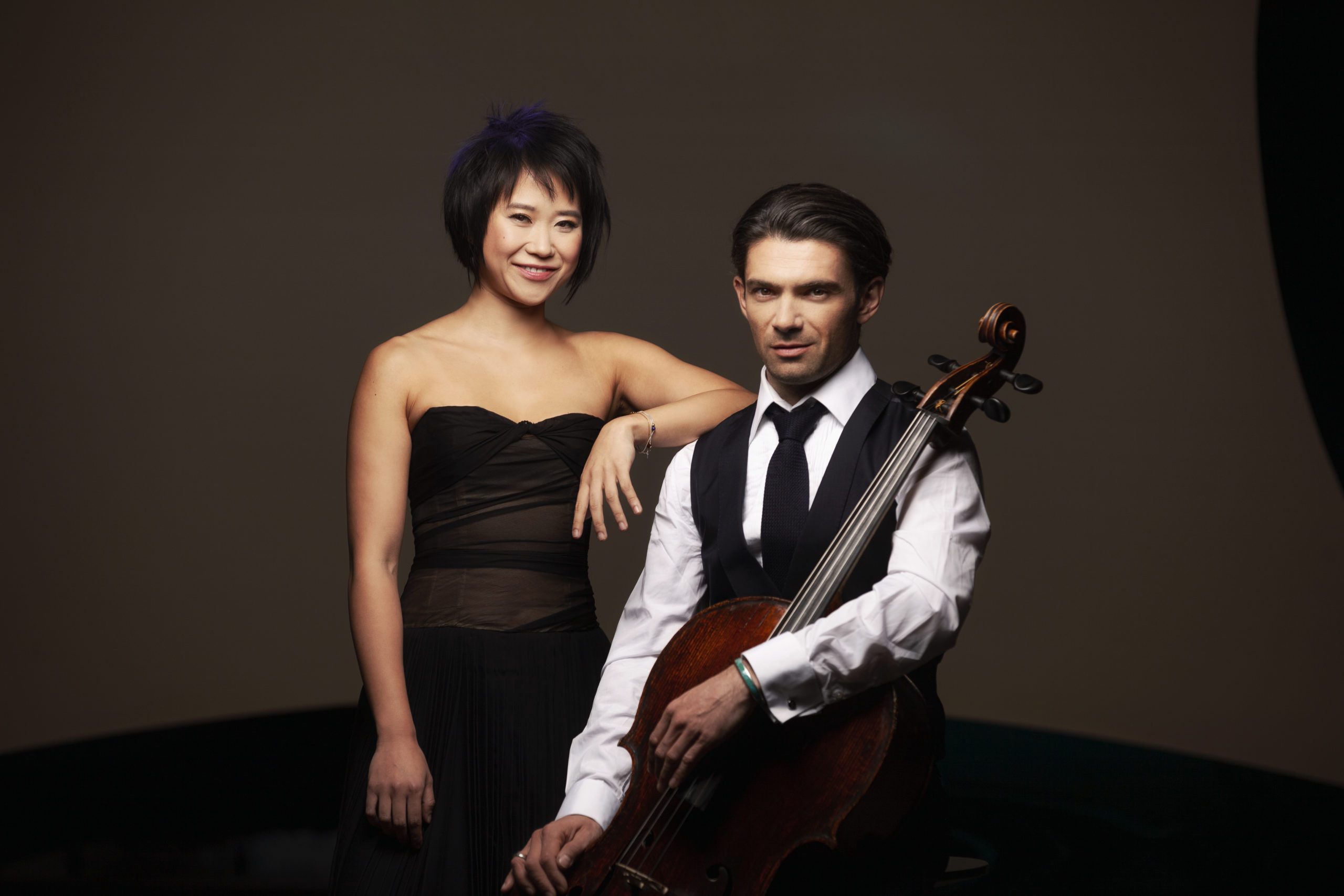
Photo: Michael Sharkey © Parlophone Records Ltd.
What could possibly be said of Yuja Wang that hasn’t already been said?
Yes, she’s glamorous, yes, she gets a lot of attention, and yes, she’s one of the world’s most celebrated pianists. But she is also warm and funny, and a very thoughtful conversationalist, strong in her opinions, it’s true, but also entirely unapologetic in her individualism. It could well be that such innate authenticity, and never feeling the need to apologize for it, has been, and continues to be, part of what draws audiences around the world to her – that, and of course, her being one of the true greats of the piano.
Born into a musical family in Beijing (her mother is a dancer; her father, a percussionist), Wang began piano as a child, and went on to study as a teenager at the famed Curtis Institute of Music. In 2002, she won the concerto competition at the Aspen Music Festival, and a year later, made her European debut with the Tonhalle Orchester Zürich led by conductor David Zinman, playing Beethoven’s Piano Concerto No. 4. Wang debuted with the New York Philharmonic at the Bravo! Vail Music Festival in 2006, and toured with the orchestra and conductor Lorin Maazel their very next season. Wang’s big international breakthrough came in 2007, when she replaced Martha Argerich as soloist in a concert with the Boston Symphony Orchestra, performing Tchaikovsky’s Piano Concerto No. 1.
In 2011, Wang made a lauded debut at Carnegie Hall, in a program featuring the works of Scriabin, Liszt, and Prokofiev, and has since gone on to work with some of the classical world’s most noted figures, including fondly remembered conductors Sir Neville Marriner, Claudio Abbado, and Kurt Masur, as well as Zubin Mehta, Michael Tilson Thomas, Paavo Järvi, and Esa-Pekka Salonen, and has worked with the likes of the Berlin Philharmonic, the Staatskapelle Berlin, the London Philharmonic, the Los Angeles Philharmonic, NHK Symphony (Tokyo), Accademia Nazionale di Santa Cecilia, and the Royal Concertgebouw orchestras. In reviewing a 2012 concert appearance in San Francisco, Joshua Kosman wrote that Wang is “quite simply, the most dazzlingly, uncannily gifted pianist in the concert world today, and there’s nothing left to do but sit back, listen and marvel at her artistry.”
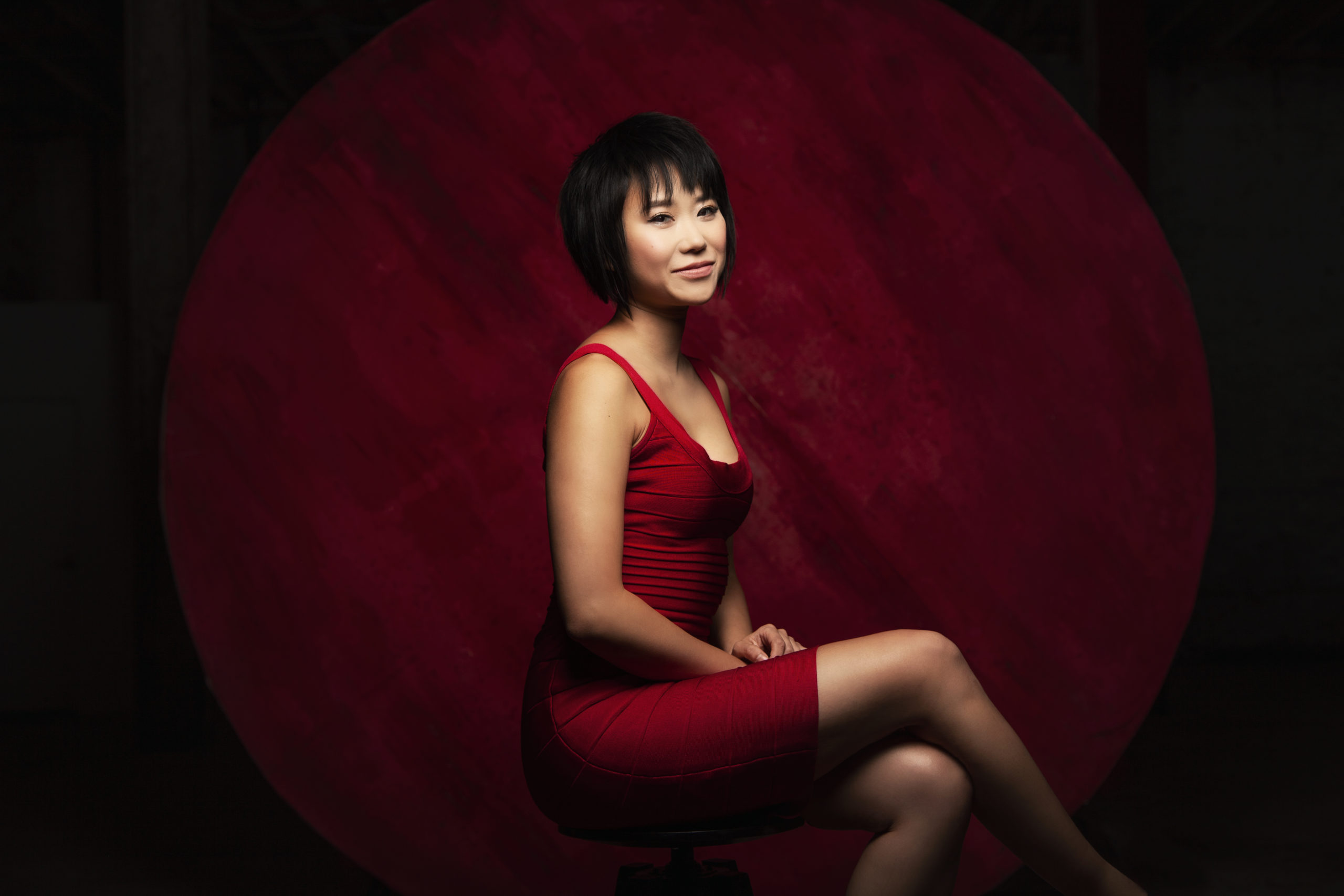
Photo: Michael Sharkey © Parlophone Records Ltd.
Wang is almost always on hectic rounds of touring, and moves regularly between continents and concert halls. 2019 has been a particularly rich time; along with her tour with Capuçon, Wang gave a hugely well-received performance at the Enescu Festival in September (as part of a tour with the Dresden Staatskapelle and conductor Myung-Whun Chung), and also performed at the inaugural edition of the Tsinandali Festival in Georgia. Last month, she gave the first London performance of John Adams’ “Must the Devil Have All the Good Tunes?”, a work commissioned by the LA Phil and written especially for Wang; music writer Jari Kallio called the performance “a ravishing experience.”
January sees further tour dates with Capuçon as well an extensive solo recital tour and concert performances with the Boston Symphony Orchestra (led by Andris Nelsons), the Toronto Symphony, (led by incoming TSO Music Director Gustavo Gimeno) the San Francisco Symphony (led by Michael Tilson Thomas) and the Philadelphia Orchestra (led by Yannick Nézet-Séguin). Chances are she may collect a few more awards along the way; she’s already been the recipient of several, including being named Musical America’s Artist of the Year in 2017. A four-time Grammy Award nominee, The Berlin Recital (Deutsche Grammophone), released in November 2018, is a live recording done at the Philharmonie Berlin; in October it won the prestigious 2019 Gramophone Classical Music Awards in the instrumental category.
The recording evocatively captures Wang’s ferociously individualistic voice, her unapologetic musicality filling space – sonic, but also intellectual and emotional. These are qualities Wang balances so skillfully in her readings of Rachmaninoff, Scriabin, Ligeti, and Prokofiev. Gramophone’s David Fanning noted in her performances of both Rachmaninoff’s B minor Prelude as well as Scriabin’s Sonata No 10 that “she moves smoothly between feathery, evocative touches and maximum eruptive volatility.” The recording is a firm personal favorite of mine for a number of reasons, chief among them its beautifully therapeutic qualities. Speaking as a simple listener, it feels as if Wang has a special talent for poking holes in the many clouds of depression that have descended with such force, weight, and consistency over the past year. The way she shapes the trills of Scriabin’s Sonata, her twisty rubato of Prokofiev’s Sonata No 8 , her fierce, eff-you-haters phrasing of Rachmaninoff’s famous Prelude in G Minor (which opens the album) – these sounds, and the feisty spirit behind them, have been instrumental in envisioning a path through some desperately sad, cloudy times.
And so it is with Chopin-Franck (Warner Classics), released today. As I wrote in my feature on the French cellist earlier this week, the album offers truly enlightening approaches with composers whose works you may think you know well, with two works by Chopin (Sonata in A Major and Polonaise brillante in C Major), the famous Sonata in A Major by Cesar Franck (in a transcription for cello by Jules Delsart), along with an encore of Piazzolla’s beloved “Grand Tango”. Recorded at Toronto’s Koerner Hall at the end of a whirlwind tour that included stops in Boston, Philadelphia, and New York’s Carnegie Hall, the work brings inspiration both intellectual and emotional, and is a luscious sonic intertwining of two highly complementary artistic sensibilities, with Wang’s performance (blazingly sparky one moment, whisperingly delicate the next) matching Capuçon’s note for note, and, as you’ll read, breath for breath. The pianist told the Los Angeles Times in 2017 that for her, “playing music is about transporting to another way of life, another way of being” and this album is a very good display of such sonic transcendence.
Wang took time over the recent Thanksgiving holiday to chat about the nature of performance and the unique joys of collaborative musical partnerships.
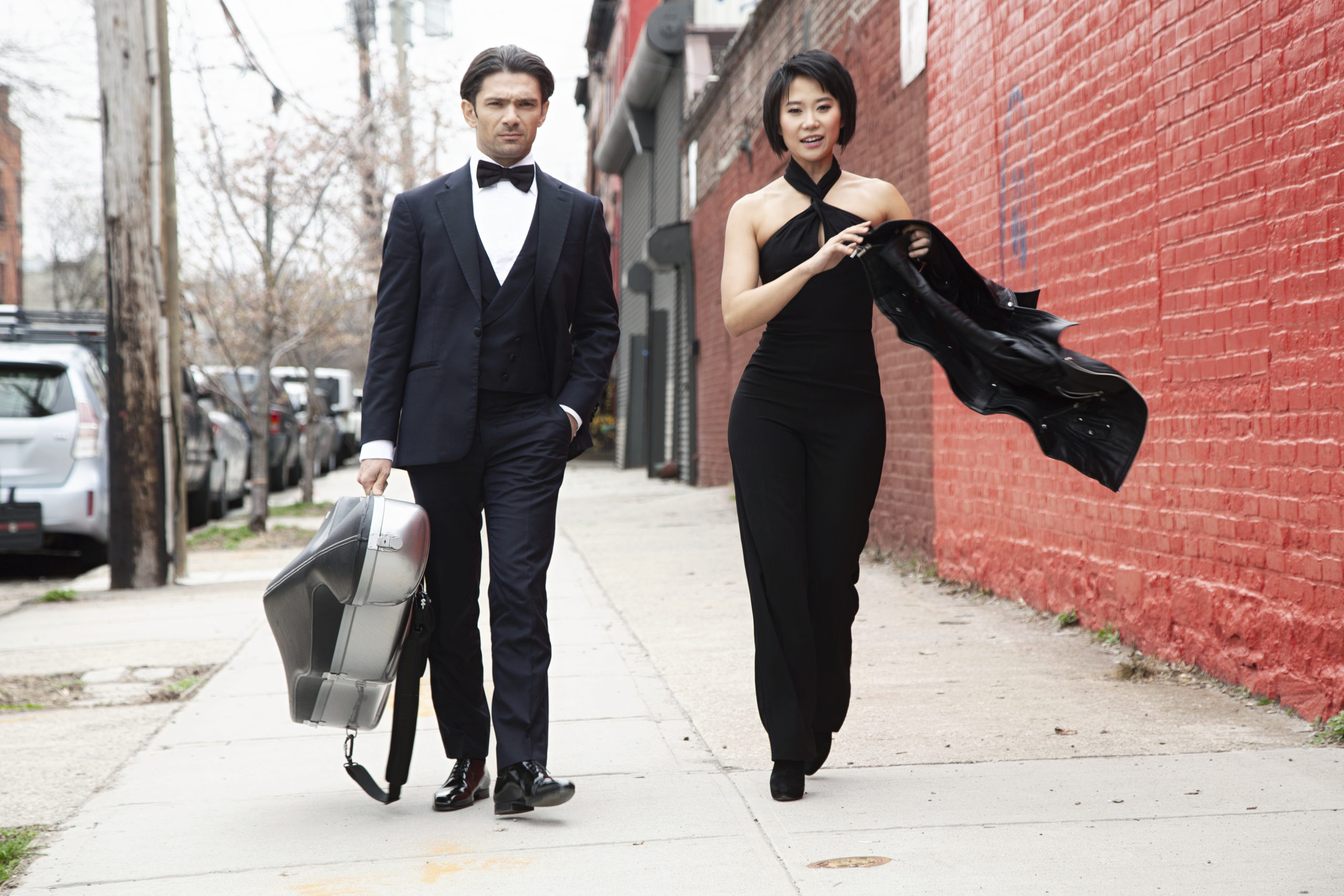
Photo: Michael Sharkey © Parlophone Records Ltd.
Gautier said he felt the creative chemistry with you immediately; did you have a similar experience?
Yes, definitely that feeling is mutual. On tour we’d sometimes joke, “Oh, we don’t have to rehearse!” We have the same ideas of phrasing and how a piece should go. It’s very flexible in terms of what we’re deciding on the spot. And with this (album), all the pieces are so centered on piano, like the Chopin Sonata – I told him, “This is harder than the solo stuff!” It was fun; it never felt like there was a dull moment, and if we play something beautiful for encores which he’s known for – like “The Swan” (Saint-Saëns’ “Le cygne” from his Le Carnaval des animeaux) or “Meditation” (from Massenet’s Thais)– he just melts every person in the concert. I enjoy that as well.
How did you decide on touring and recording these pieces specifically?
We did the tour and decided on Chopin, since I am always a big fan of Chopin. Even talking about repertoire is very easy, we never have to explain – it was just, “Okay, let’s do that!” And I always loved the Franck sonata. Violinists will hate me, but I love how it sounds on the cello more than the violin version,. We did Rachmaninoff when we played Carnegie Hall – he did record it in 2001, but I think it’s time to do another version.
How does the energy of your partnership affect other things you do?
I have a few fixed partnerships, and he is definitely one of them, the other is Leonidas (Kavakos). Gautier and I did that recording in April and now we are preparing to go out for another three weeks in January – it is a big chunk of your life, to travel together and play together. I always look forward to that because, as a pianist, you always usually travel by yourself, and this way it’s like having a partner around musically. I mean, as a woman and musician, this sort of work seeps into your psyche. It’s not like playing a concerto where you are soloist and there’s an orchestra. The hardest is the solo recitals, where you’re traveling by yourself and busy onstage for ninety minutes. But with Gautier or Leonidas, I’m onstage with another person, making music together – in a way it’s more relaxed, very relaxed – which I love.
That’s the biggest difference, but you know, you count on the other person as well, you give and take onstage, it’s not just you with full responsibility. And, of course, there’s the usual cliche, “we learn a lot from each other” – and of course we do – but in a way it feels like a musical family to be around. You can count on someone, and be very comfortable with them.
It feels protecting?
Yes, protecting, yes! That’s the word. And, because (Kavakos and Capuçon) are such amazing musicians, if I’m having an off day, if I’m tired, they are there to support and to be there. The recording session (in Toronto) was at the end of a two-week tour, and there was a photo session, and an intense recording session; it was a lot, but because Gautier was there I agreed to do it. He is very different from Leonidas – I don’t want to compare! – but with Gautier, we just breathe the music together and it’s there, super-spontaneous.
It’s a musical intimacy that feels rare for its authenticity.
It’s true, and we try to protect that as much as can onstage. It’s very delicate, very vulnerable, that kind of intimacy, and it’s really about intensely listening and just being there for each other, breathing together. It sounds so strange, but because of that, it’s why it feels so spontaneous – because there’s this other way of making chamber music, which is very calculated and planned. And that’s never my way of doing things, but the contrast of doing that also sometimes brings very good results. I think the only other musician like that was Claudio Abbado. He never said anything – he used his gestures and his musicians knew what to do. Gautier is a bit like that; his bowing and his breathing, his whole body is so involved in music. So artistically speaking, it was love at first sight!
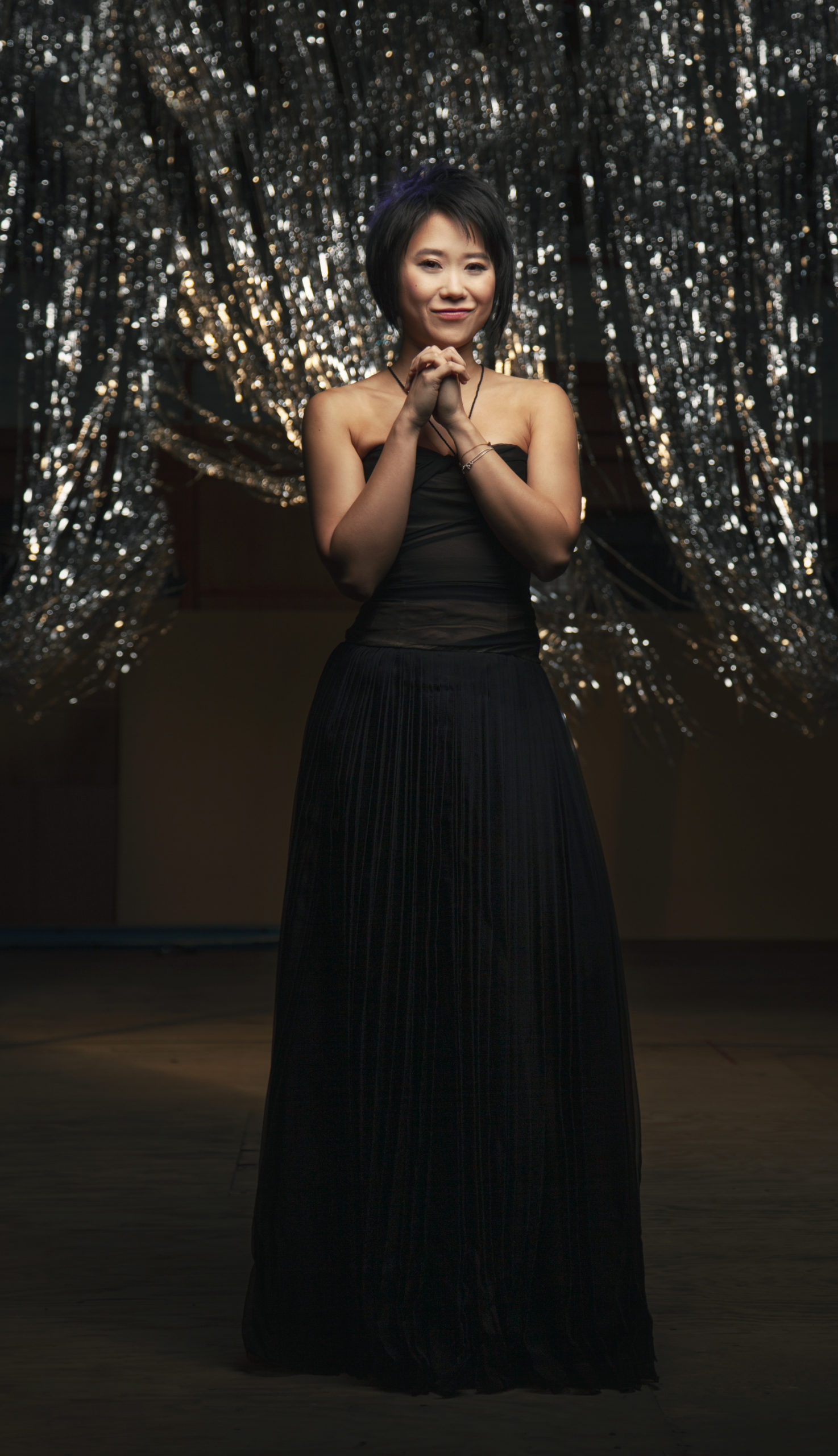
Photo: Michael Sharkey © Parlophone Records Ltd.
Has this partnership changed your relationship with the piano? I would imagine when you experience such creative closeness, you return to your own instrument with a slightly different perspective… ?
I wouldn’t say I play very differently actually, I feel like the repertoire we chose is so piano-oriented so sometimes I feel as if I’m playing solo. But you learn how they use the bow, how they sing, what colours you can bring, and how they see music. That’s the thing with Gautier: we see it very similarly. When I play concerts, I always have been the same way – I’m very reactive; I respond to something on the spot. I see what others are doing and I respond like that.
I guess that’s why I love playing this music and my partners are happy with it too – it’s all about listening, which I learned from Curtis: that’s how you should play music. I’m not so much, I think, trying to be like the leader or like, “Do this! You follow me!” – I’m never like that in any kind of way, and I have the same principles doing concertos or chamber music. But solo is a very different thing, because it’s like being a conductor: you decide what pieces you’re going to play, what they mean to you, and you have to take full responsibility for everything. So that’s a totally different way of operating.
But I would imagine you think of Chopin and Franck in new ways now.
The Chopin cello sonata is very enigmatic for me. I never played any Franck in any real sense! We did Rachmaninoff together – I’m doing Rachmaninoff 4 this week in Cleveland, it’s a language I know very well, so I would say it’s in my comfort zone – but the Chopin was a puzzle for me. The Polonaise, okay, that was very fun to play, but especially after we did the Sonata, it was so intricate, and so much voice, the cello… he just had one line and had to go in and out, but between all of my five lines, and the harmony is so forward-looking. It’s not just, “Oh, what a nice melody by Chopin!” except the third movement, which is so meditative and beautiful – especially the way Gautier played it! But the rest is a Mazurka, and it’s the Chopin we know, but not; he didn’t finish it, and it’s a late work and … it makes you think, where would he go if he didn’t die at 39? The harmony… it’s fun, but it’s really hard. There’s one passage in the first movement, these chords are almost like in Petrushka –but then you have to think about the balance with the cello and the melody.
I think, in a way, I do think more about orchestrating when I go back to my solo music: how to balance the sound, each voice in harmony. Those are the things that become more obvious as a result of doing chamber music-making.
Gautier called the Polonaise “pianistic.”
I think maybe he is conscious of choosing this repertoire because he’s aware that I am in my comfort zone doing all this stuff, rather than sometimes, you know… I mean, I don’t want to just be playing accompaniment…
… but it seems like this is very much both of you doing equal give-and-take, like a tennis match.
Yes, totally!
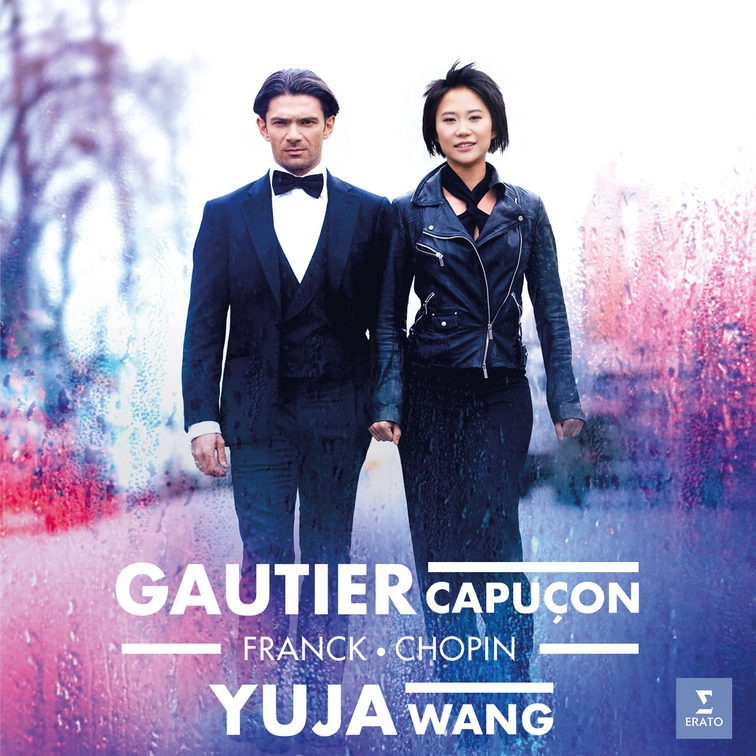
Warner Classics
And I would imagine things will expand now? Gautier mentioned you’re in planning stages for future projects.
Exactly. I just love the chamber music by Rachmaninoff, and why not the cello sonata? There’s so much other repertoire, I was telling him yesterday, that I want to do: “Let’s do Brahms! Let’s do Rachmaninoff!” He already recorded that, but it’s very special when we do it. We can choose to stay with Russians: Shostakovich, Rachmaninoff, Prokofiev… I mean, he makes the cello sing but he can also make it such a beast; I just take care of voicing. And it’s fun, I don’t have to always worry about, “Oh, I’m covering the cello now” because he has such a big presence.
So do you!
We little people have big presence!
